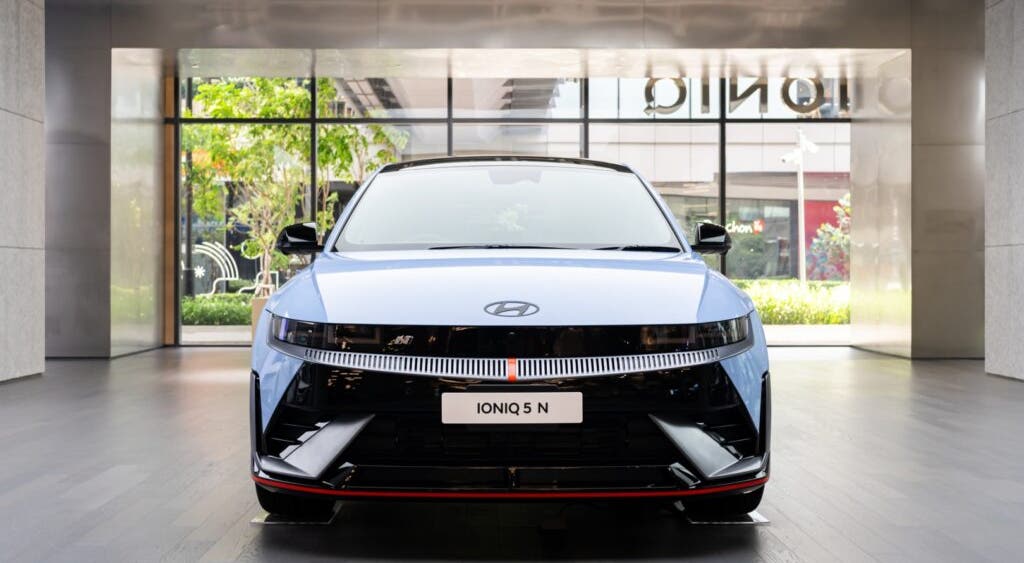What EV Slowdown? Asian Auto Giant Plans To Invest $50B To Ramp Up Production And Hire 80K Employees GM, EV, Motor, targets, Hyundai, Benzinga, OTC:HYMTF, production, Jose Munoz, production, South Korea, United States market, electric vehicle (EV) by https://www.benzinga.com/

AI Insights:
Simple Explanation:
A big car company from Asia, called Hyundai, is going to spend a lot of money (about $50 billion) over the next three years to make more electric cars. They want to create new jobs for people and help the environment by making cleaner cars. Some other car companies are not doing so well with electric cars, but Hyundai thinks it can succeed and wants to focus on the American market. Read from source...
Critical Perspective:
1. The title of the article is misleading and sensationalized, implying a contradiction between EV slowdown and Hyundai's investment plans, when in fact it is just one company's perspective on the market. A more accurate title would be "Hyundai Plans To Invest $50B In EV Production Despite Market Challenges".
2. The article relies heavily on quotes from Hyundai executives and their positive outlook on electric vehicles, without providing any counterarguments or data to support their claims. This creates a one-sided and unbalanced presentation of the issue, which may not reflect the reality for other automakers or consumers.
3. The article mentions GM's withdrawal of EV production targets as a contrast to Hyundai's investment, but does not explain the reasons behind it or how it affects the overall EV market. This creates confusion and inconsistency in the narrative, as well as an unfair comparison between two different companies with different strategies and goals.
4. The article ends with a statement that Hyundai's decision comes "at a time when other automakers are slashing EV targets", but does not provide any evidence or examples of this trend, nor its implications for the industry. This leaves the reader with an impression that there is a widespread crisis in EV adoption, without giving them the necessary context and information to form their own opinion.
5. The article uses emotional language and exaggeration, such as "doubling down on electrification" and "very committed", which may appeal to some readers' feelings, but do not convey any factual or analytical value. These phrases also imply a sense of urgency and pressure, which may not be justified by the current state of the EV market.
Investment Analysis:
We are not financial advisors. It's always essential for you to consult with a financial advisor and do your research before making any decisions about investments.
1. Hyundai Motor Group (HMG) is planning to invest $50 billion over the next three years to boost EV production, which is a significant amount of capital that could be used for other purposes, such as research and development or expanding into new markets. This suggests that HMG has a strong belief in the long-term growth potential of the EV market and wants to establish itself as a leader in this sector.
2. The investment will create 80,000 jobs, which is good news for the economy and society, but also puts pressure on HMG's profitability and cash flow. This could lead to higher debt levels or lower dividends for shareholders in the short term.
3. The decision to ramp up EV production comes at a time when other automakers are scaling back their EV targets, such as GM, which withdrew its goal of making 400,000 EVs from 2022 to the first half of 2024. This could indicate that HMG sees more opportunities and less risks in the EV market than its competitors, or that it has a more optimistic outlook on the future demand for EVs.
4. The investment could also face regulatory hurdles, such as environmental permits, land acquisition, or labor disputes, which could delay or increase the costs of the project. Additionally, HMG may encounter technical challenges in developing new EV models, batteries, or charging infrastructure that could affect its competitiveness and market share.
5. The investment could pay off if HMG successfully captures a significant share of the growing global EV market, which is expected to reach $1.2 trillion by 2030, according to a report by Allied Market Research. This would benefit not only HMG's revenues and profits, but also its brand image and social responsibility as a leader in sustainable mobility.